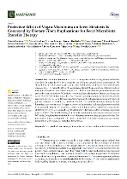Protective Effect of Vegan Microbiota on Liver Steatosis Is Conveyed by Dietary Fiber: Implications for Fecal Microbiota Transfer Therapy

Autor
Heczková, Marie
Módos, István
Hradecký, Jaromír
Hudcovic, Tomáš
Kuzma, Marek
Pelantová, Helena
Bušková, Irena
Funda, David
Goliáš, Jaroslav
Draboňová, Barbora
Jarkovská, Jarmila
Králová, Mariana
Cahová, Monika
Datum vydání
2023Publikováno v
NutrientsRočník / Číslo vydání
15 (2)ISBN / ISSN
ISSN: 2072-6643Informace o financování
MSM//LX22NPO5104
UK/COOP/COOP
Metadata
Zobrazit celý záznamKolekce
Tato publikace má vydavatelskou verzi s DOI 10.3390/nu15020454
Abstrakt
Fecal microbiota transfer may serve as a therapeutic tool for treating obesity and related disorders but currently, there is no consensus regarding the optimal donor characteristics. We studied how microbiota from vegan donors, who exhibit a low incidence of non-communicable diseases, impact on metabolic effects of an obesogenic diet and the potential role of dietary inulin in mediating these effects. Ex-germ-free animals were colonized with human vegan microbiota and fed a standard or Western-type diet (WD) with or without inulin supplementation. Despite the colonization with vegan microbiota, WD induced excessive weight gain, impaired glucose metabolism, insulin resistance, and liver steatosis. However, supplementation with inulin reversed steatosis and improved glucose homeostasis. In contrast, inulin did not affect WD-induced metabolic changes in non-humanized conventional mice. In vegan microbiota-colonized mice, inulin supplementation resulted in a significant change in gut microbiota composition and its metabolic performance, inducing the shift from proteolytic towards saccharolytic fermentation (decrease of sulfur-containing compounds, increase of SCFA). We found that (i) vegan microbiota alone does not protect against adverse effects of WD; and (ii) supplementation with inulin reversed steatosis and normalized glucose metabolism. This phenomenon is associated with the shift in microbiota composition and accentuation of saccharolytic fermentation at the expense of proteolytic fermentation.
Klíčová slova
fecal microbiota transfer, inulin, liver steatosis, proteolytic fermentation, vegan microbiota
Trvalý odkaz
https://hdl.handle.net/20.500.14178/2149Licence
Licence pro užití plného textu výsledku: Creative Commons Uveďte původ 4.0 International







